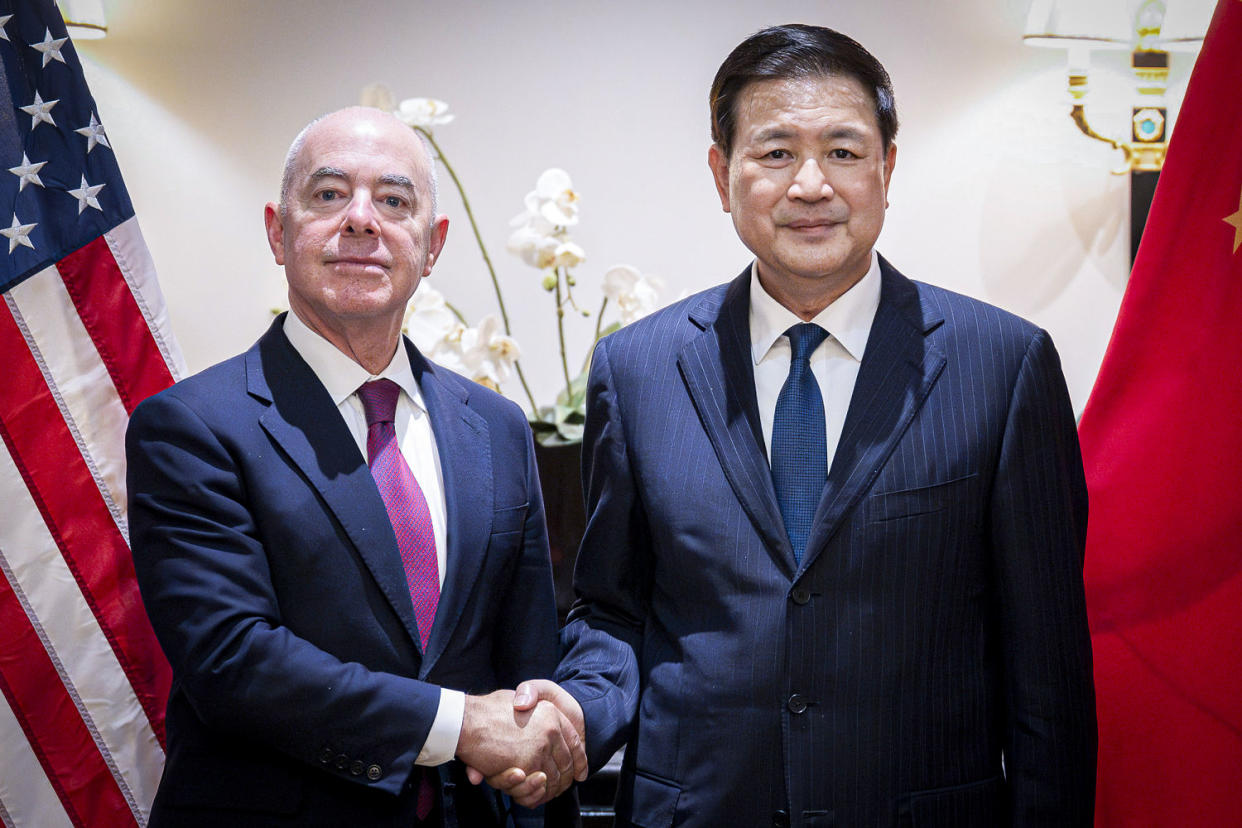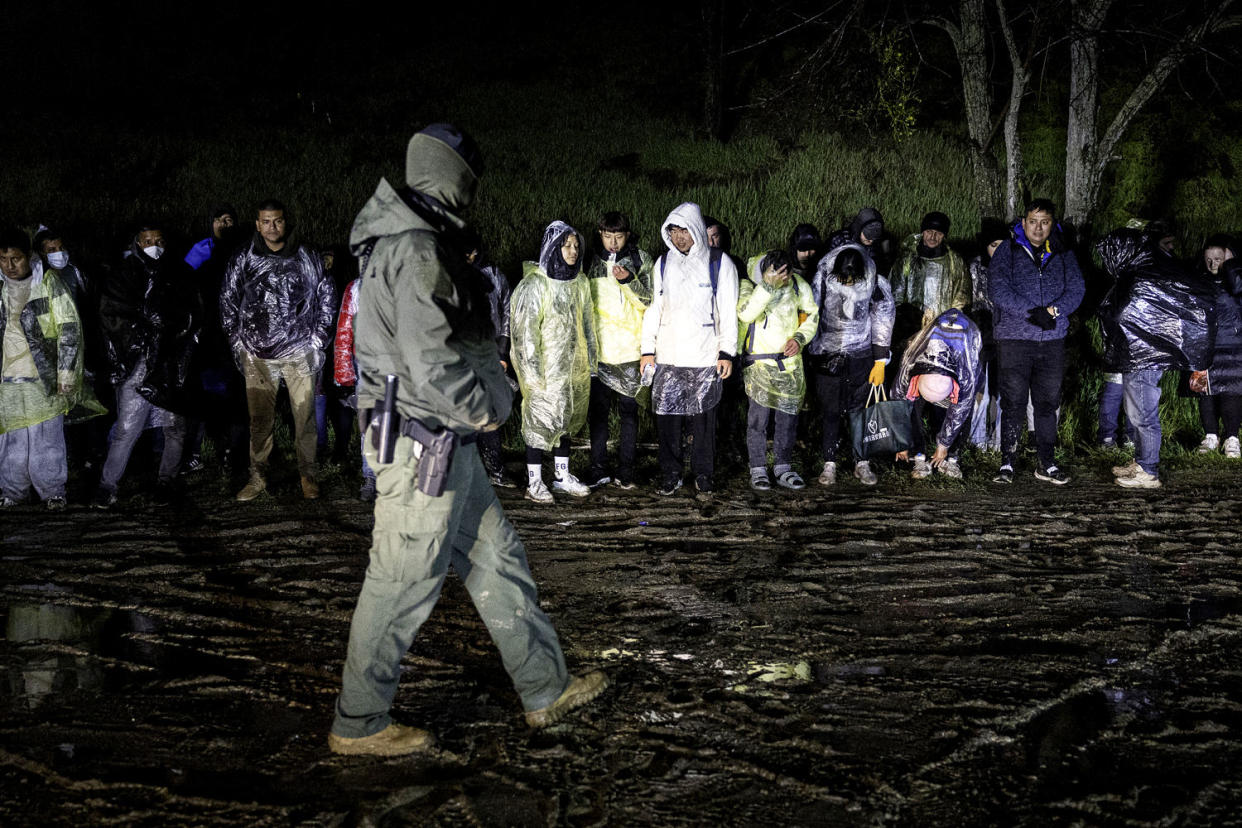U.S. and China in high-level talks to deport more Chinese nationals, Mayorkas says
The U.S. is conducting high-level discussions with China aimed at increasing the number of Chinese nationals deported from the United States, Homeland Security Secretary Alejandro Mayorkas said in an exclusive interview with NBC News.
Such an agreement would be a breakthrough in U.S.-China relations and American immigration policy. China has long been uncooperative with U.S. efforts to deport Chinese citizens back to their country, according to American officials.
In the last two years, that has become especially consequential as the number of migrants from China illegally crossing the U.S.-Mexico border has skyrocketed to the tens of thousands.
Mayorkas told NBC News that China’s refusal to accept deportations “may be changing.”
“We have been working with the People’s Republic of China to actually receive individuals whom we have determined are not eligible to remain in the United States,” Mayorkas said. He added that he raised the issue in February when he met in Vienna with his Chinese counterpart, Minister of Public Security Wang Xiaohong.
Mayorkas said he is “hopeful” that these discussions will lead to a change in the current situation. "We are in a wait and see posture but we are working with our counterparts," he said. "It's a process."
The talks come as the number of Chinese nationals crossing the U.S.-Mexico border without authorization has exploded. Customs and Border Protection logged over 24,000 such crossings in Fiscal Year 2023, up from just over 2,000 the prior year — a more than elevenfold increase. This is part of a larger surge in the number of migrants from all over the world making the dangerous journey to the U.S.’s southern border, which saw record-high illegal crossings in December.
The meeting that included Mayorkas and Wang, his counterpart, took place in Vienna on Feb. 18. NBC News is reporting for the first time that these binational security talks included a potential agreement on deportations.
The talks come amid a broader thaw in relations between the U.S. and China, the world’s two largest economies, after a Chinese spy balloon's flight over the U.S. sparked a diplomatic crisis. A historic in-person summit between President Joe Biden and Chinese President Xi Jinping took place in San Francisco in November, followed by a phone conversation Tuesday.

Liu Pengyu, spokesperson for the Chinese embassy in Washington, D.C., said in a statement provided to NBC News that China cooperates with efforts to repatriate illegal immigrants. “Illegal immigration is an international problem that needs the cooperation of relevant countries to solve it together,” Liu said. “China has had good cooperation with some countries on the issue of repatriating illegal immigrants, and is willing to continue to strengthen cooperation with relevant countries on this issue.”
Liu’s statement also said, “The Chinese government adheres to the principle of ‘verification first, then repatriation’ in repatriating illegal immigrants. We will accept repatriation of Chinese citizens who have been verified to be from mainland China.”
The U.S., though, has for years counted China among a list of “recalcitrant” or “non-cooperative” countries when it comes to deportations, a list that has at times included other geopolitical adversaries like Russia, Venezuela and Cuba.
DHS cited China’s noncooperation in a 2021 report on “the threat posed by the people’s Republic of China,” writing that “Beijing’s refusal to cooperate forces ICE to release hundreds of PRC nationals, many with convictions for violent crimes, into American communities, jeopardizing public safety.”
In 2022, in retaliation for a visit by then-Speaker Nancy Pelosi to Taiwan, a self-ruling island Beijing claims as its territory, China officially cut off cooperation on deportations, formalizing what had been de facto policy. That a new agreement on deportations is currently under discussion marks a stark change from recent years.

Although the U.S. is able to deport some people to China every year, it has to resort to expensive and logistically challenging “Special High-Risk Charter” flights, sometimes via South Korea, according to U.S. Immigration and Customs Enforcement records.
The U.S. successfully deported eight Chinese citizens last week, according to a U.S. official who spoke to NBC News on condition of anonymity.
ICE records indicate it deported 288 people to China last fiscal year; meanwhile, the number of Chinese nationals living in the U.S. with final orders of deportation is around 100,000, according to internal data obtained last year by The New York Times.
An agreement allowing expanded, direct deportations to China would likely have a large impact on these numbers. However, such deportations would still be resource-intensive, and thus likely overwhelmed by the current number of arrivals. Most migrants apprehended at the southern border, whether from China or elsewhere, are released into the United States to await yearslong proceedings in severely backlogged immigration courts.
Mayorkas told NBC News that the recent, bipartisan Senate bill on immigration would have fixed those backlogs, but the measure was blocked by pro-Trump Republicans. Until Congress acts, he said, his department will be unable to meaningfully reduce migration from China or elsewhere.
“Fundamentally, our system is not equipped to deal with migration as it exists,” Mayorkas said.
